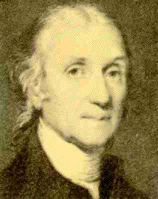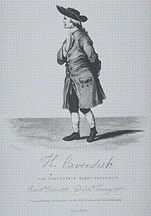October 10: Henry Cavendish
Henry Cavendish (1731)
It was also on this date, October 10, 1731, that British physicist and pioneer chemist Henry Cavendish was born in Nice, France. The son of Lord Charles Cavendish, and nephew of the Duke of Devonshire, he entered St. Peter's College, Cambridge in 1749 at age 18, but left without graduating four years later. Chambers' Encyclopedia describes Cavendish as a
...silent, solitary man, he had his magnificent library in London, four miles from his residence on Clapham Common, so that he might not encounter persons coming to consult it. His female domestics had orders to keep out of sight, on pain of dismissal. His dinner he ordered daily by a note placed on the hall table.
It seems Cavendish was particularly terrified of women and avoided most social contacts. He did maintain membership in the Royal Society Club and was well respected by his colleagues, but that may have had to do with his wealth – he was, by inheritance, the wealthiest man in England at the time – as much as with his scientific achievements.
He published his first paper, Factitious Airs, a meticulous study of the properties of gases, in 1766, when he was 35. He calculated the first accurate composition of the atmosphere, discovered that water is composed of two gases, discovered hydrogen (which he called "inflammable air" – Antoine Lavoisier gave hydrogen its name), and correctly calculated the mean density of the earth..
Henry Cavendish died on 24 February 1810, leaving a large fortune which endowed the Cavendish Laboratory, which is still in operation at Cambridge. Cavendish never went to church. His biographer, George Wilson, in his 1851 Life of Cavendish, says "As to Cavendish's religion, he was nothing at all."*
* George Wilson, The Life of the Hon. Henry Cavendish, London: Cavendish Society, 1851, p. 180.
Originally published October 2003 by Ronald Bruce Meyer.



